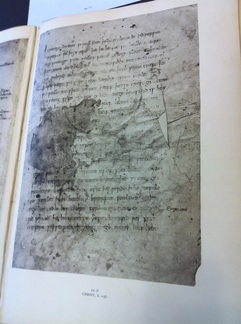 The Exeter Book - facsimile The Exeter Book - facsimile Yesterday I had the enormous pleasure of seeing the original Exeter Book. It's kept in Exeter Cathedral's Library and has been there ever since it was donated by Bishop Leofric in 1072. Yes, that's right, 1072 - a thousand odd years ago. Opening times HERE It's impossible not to feel awed. This is a book of poetry and riddles written in Old English from before the Norman conquest! With a lot of help from the librarian, Peter Thomas, I could actually read the odd word. The original is kept under glass now but there were two large facsimiles that we could leaf through. You will find some information about the Exeter Book on Wikipedia HERE including two riddles in both old and modern English. Wikipedia doesn't tell you about the little doodles in the margins, the first page (eight are missing from the beginning) with the gluepot stain and the knife cut. It doesn't tell you that some pages glitter from minute traces of gold - this heavy book was probably used as a press.  Put your gluepot here? Put your gluepot here? Another endearing feature was the full stops. As you can see from these pages, poetry then doesn't look like poetry now. Perhaps because space and parchment or velum was expensive, the lines ran on. Clearly the decorated capitols indicate a new beginning, but between sentences and verses something like this was used - :7 except that the 7 had a long tail that hung below the line. Unlike our ellipsis ... which implies something further, several of these :7:7:7 meant this really, really, really is the end. I was really thrilled to see runes on some pages - for a Tolkien fan, it's all very Elvish! Also, there were characters that I had assumed were decorated, but turn out to be characters we no longer use. For example, in the picture above (click on it to enlarge) you can see the capitol D in SID and the first in MADOLAD both have cross lines through the upright stroke (I'm sure there's technical terms for these, but I don't know them). That makes it a 'th' sound - sith and Matholad. It's a pretty letter. I'm sorry we don't use it any more! Do go and see this treasure if you can. Something to ponder on, is that these verses were copied down in the C10th and yet it wasn't published (with translation) until 1842. No author signed copies then...
3 Comments
|
What they did next...Scroll down to find out about our previous winners. Archives
April 2024
Categories
All
|
- Home
- What We Do
-
Competitions
- Our Winners
- 2024 Exeter Novel Prize
- 2023 Exeter Novel Prize
- 2023 Exeter Story Prize and Trisha Ashley Award
- 2022 Exeter Novel Prize
- 2022 Exeter Story Prize & Trisha Ashley Award >
- 2021 Exeter Novel Prize >
- 2021 Exeter Story Prize and Trisha Ashley Award >
- 2020 Exeter Novel Prize >
- 2020 Exeter Story Prize and Trisha Ashley Award >
- 2019 Exeter Novel Prize >
- 2019 Exeter Story Prize and Trisha Ashley Award >
- 2019 Exeter Flash Competition >
- 2018 Exeter Novel Prize
- 2018 Exeter Story Prize and Trisha Ashley Award >
- 2018 Exeter Flash Competition >
- 2017 Exeter Novel Prize
- 2017 Exeter Story Prize and Trisha Ashley Award
- 2016 Exeter Novel Prize Award Ceremony and Judge's Report
- 2016 Exeter Story Prize
- 2015 ENP Award Ceremony and Judge's reports
- 2015 ESP, Award Ceremony and Judges' Report
- 2014 ENP Award Ceremony and Judge's Report
- 2013 ENP Award Ceremony and Judge's Report
- 2017 Flash Winners
- 2016 Flash Winners
- 2015 Flash Winners
- 2014 Flash winners
- 2013 Flash Winners
- 2012 Flash Winners
- 2011 Flash Winners
- 2017 Wow! Winners
- 2016 Wow! Winners
- 2015 Wow! Winners
- 2014 Wow! Winners
- About us
- Blog
- Links
- Privacy Policy
Photos from Noah Sussman, Noah Sussman, Noah Sussman, crosescribe, The hills are alive*, Dave_S., h.koppdelaney, twm1340, Cristian V., PoloGoomba, RachelH_, M Glasgow, wendati
- Home
- What We Do
-
Competitions
- Our Winners
- 2024 Exeter Novel Prize
- 2023 Exeter Novel Prize
- 2023 Exeter Story Prize and Trisha Ashley Award
- 2022 Exeter Novel Prize
- 2022 Exeter Story Prize & Trisha Ashley Award >
- 2021 Exeter Novel Prize >
- 2021 Exeter Story Prize and Trisha Ashley Award >
- 2020 Exeter Novel Prize >
- 2020 Exeter Story Prize and Trisha Ashley Award >
- 2019 Exeter Novel Prize >
- 2019 Exeter Story Prize and Trisha Ashley Award >
- 2019 Exeter Flash Competition >
- 2018 Exeter Novel Prize
- 2018 Exeter Story Prize and Trisha Ashley Award >
- 2018 Exeter Flash Competition >
- 2017 Exeter Novel Prize
- 2017 Exeter Story Prize and Trisha Ashley Award
- 2016 Exeter Novel Prize Award Ceremony and Judge's Report
- 2016 Exeter Story Prize
- 2015 ENP Award Ceremony and Judge's reports
- 2015 ESP, Award Ceremony and Judges' Report
- 2014 ENP Award Ceremony and Judge's Report
- 2013 ENP Award Ceremony and Judge's Report
- 2017 Flash Winners
- 2016 Flash Winners
- 2015 Flash Winners
- 2014 Flash winners
- 2013 Flash Winners
- 2012 Flash Winners
- 2011 Flash Winners
- 2017 Wow! Winners
- 2016 Wow! Winners
- 2015 Wow! Winners
- 2014 Wow! Winners
- About us
- Blog
- Links
- Privacy Policy

 RSS Feed
RSS Feed


